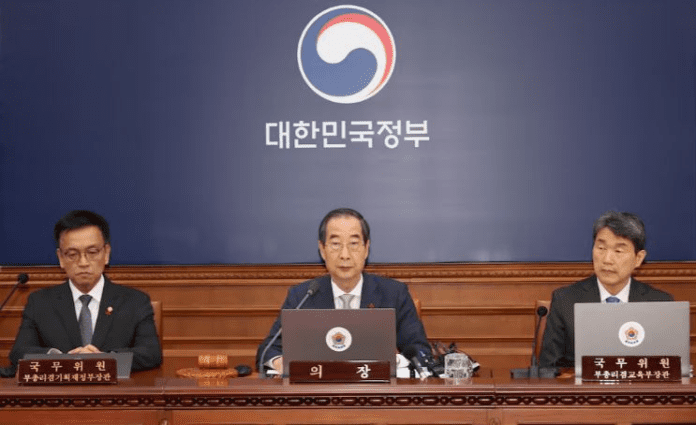
By Reuters
South Korean President Yoon Suk Yeol vowed on Saturday to fight for his political future after being impeached in a second vote by the opposition-led parliament over his brief attempt to impose martial law, a move that shocked the nation.
The Constitutional Court will decide within six months whether to remove Yoon from office. If removed, a snap election will be called. Meanwhile, Prime Minister Han Duck-soo, appointed by Yoon, has assumed the role of acting president, as Yoon’s presidential powers are suspended halfway through his five-year term.
“I will give all my strength and efforts to stabilise the government,” Han told reporters following the vote. He later chaired a National Security Council meeting, urging the country to maintain a “watertight readiness posture” to deter potential provocations from North Korea.
The crisis, which has led to the resignation or arrest of several senior defence and military officials, has raised concerns about South Korea’s ability to counter nuclear-armed North Korea, especially as Pyongyang expands its arsenal and deepens ties with Russia.
Yoon is the second conservative president in a row to be impeached in South Korea, following Park Geun-hye’s removal in 2017. He narrowly survived a first impeachment vote last weekend after his party boycotted it, depriving parliament of a quorum.
“Although I am stopping for now, the journey I have walked with the people over the past two and a half years toward the future must never come to a halt. I will never give up,” Yoon said, signaling defiance despite growing isolation.
Protesters near parliament celebrating Yoon’s impeachment rejoiced, waving LED sticks as music played. In contrast, a rally of his supporters dispersed after the news broke.
Opposition Push and Parliamentary Numbers
Opposition Democratic Party leader Lee Jae-myung urged the jubilant crowd near parliament to press for Yoon’s swift removal. “You, the people, made it. You are writing a new history,” he said to protesters braving subfreezing temperatures.
The impeachment motion passed with support from at least 12 members of Yoon’s People Power Party, joining opposition parties controlling 192 seats in the 300-member national assembly. The vote tally was 204 in favor, 85 against, with three abstentions and eight invalid ballots.
Ruling Party in Disarray
The crisis has fractured the ruling party, with its leader Han Dong-hoon defying calls to resign after supporting impeachment, calling it “inevitable to normalise the situation.”
Yoon sparked outrage on December 3 by granting the military sweeping emergency powers to target “anti-state forces” and counter obstructionist political opponents. He rescinded the martial law declaration just six hours later after parliament overwhelmingly rejected the decree, plunging the nation into a constitutional crisis.
Despite apologising, Yoon defended his actions and resisted calls to resign. Opposition parties initiated the impeachment vote, supported by large demonstrations.
Criminal Investigation and Future Challenges
Yoon is also under criminal investigation for alleged insurrection over the martial law declaration and has been banned from overseas travel. In a defiant speech on Thursday, he vowed to “fight to the end,” arguing that his decree was necessary to protect democracy from political opponents undermining the country.
However, analysts warn that Yoon’s impeachment is unlikely to resolve the political turmoil. “It is not even the beginning of the end,” said Leif-Eric Easley, a professor at Ewha University in Seoul.
The political crisis has also cast a shadow on opposition leader Lee Jae-myung, who narrowly lost to Yoon in 2022 and is seen as a strong contender in a potential snap election. Lee faces legal troubles, with convictions and other rulings pending that could disqualify him from running.
Amid widespread divisions, some Yoon supporters expressed despair over the impeachment, while anti-Yoon demonstrators called for his resignation to resolve the crisis.
Global and Economic Impacts
Yoon was initially welcomed in Washington and other Western capitals for championing global democracy and freedom. However, his leadership has faced criticism at home over contentious remarks and heavy-handed responses to negative media coverage.
The ongoing uncertainty has rattled financial markets and threatened South Korea’s reputation as a stable democracy. In response, the finance minister will convene an emergency economic meeting on Sunday. The foreign minister has also met with the U.S. ambassador, while senior diplomats reassured Japan and China of continuity in South Korea’s foreign policy.




![SHA Suspends Dozens of Health Facilities Over Alleged Fraud [LIST]](https://citymirror.ke/wp-content/uploads/2024/12/image-14-218x150.png)

